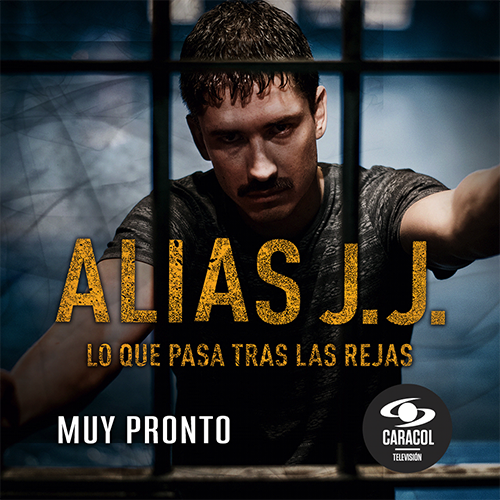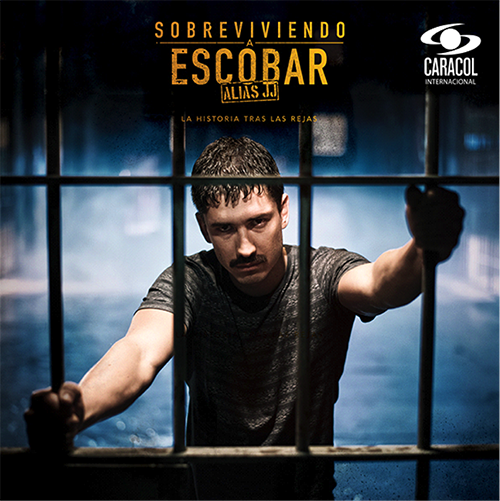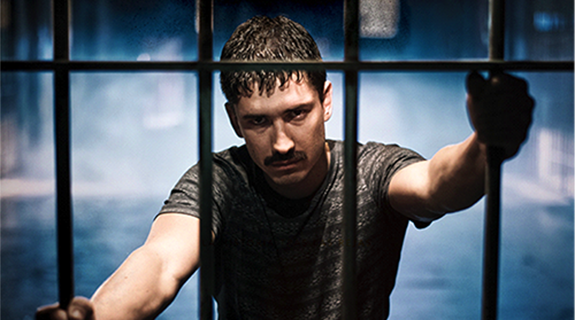For the launch of Caracol Television’s new series about Alias J.J.—Medellín cartel lieutenant and right-hand man to legendary drug trafficker Pablo Escobar—the Colombian channel developed two campaigns: one aimed at the local market and the other at international viewers.
The series Alias J.J., lo que pasa tras las rejas (Alias J.J., What Happens Behind Bars) premiered February 8, and is licensed to Netflix.
Based on the book Sobreviviendo a Pablo Escobar: “Popeye” El Sicario, 23 años y 3 meses de cárcel (Surviving Pablo Escobar: “Popeye” the Hitman, 23 years and 3 months in prison), the series depicts the years the character spent in prison, portraying the complex reality he faced behind bars, particularly after Escobar’s death.
The series, starring Juan Pablo Urrego and Nicole Santamaría, is a high-quality production, shot by two units armed with 4K cinema lens cameras on the Colombian locations of Bogotá, Medellín, Cali and Girardot.
“For Colombian viewers, the story of Alias J.J. revives one of the country’s most violent historical moments, hence the need to give the [local] advertising special treatment,” says Andrés Barrera Lugo, creative director at Caracol Television.
The local campaign aimed to show what happens behind bars when one of the [world’s] most wanted criminals surrenders to justice and is sentenced,” says Barrera. All the pieces created for television, digital, social and printed media use the tagline “Lo que pasa tras las rejas” (“What happens behind bars”).
For international audiences, the channel implemented a global marketing strategy, “knowing we had to introduce the main character to an audience that perhaps did not know him,” says Rodrigo Romero, director of international sales at Caracol Television.
“When we present him as a Medellín cartel member, that creates a context that helps the audience better relate to the story.”
The international campaign focused on the fact that after years of silence, Alias J.J., the only survivor of Pablo Escobar’s cartel, will tell his side of the story while he’s still imprisoned.
“It is very important to make it clear that this story begins during Pablo Escobar’s decline and recounts the events after his death from the perspective of John Jairo Velásquez, [also known as] Alias J.J.,” says Romero.
Marketing the series under two different names is one of the stark differences between the local and international campaigns. In Colombia the show uses the title Alias J.J., whereas in the international market it’s called Sobreviviendo a Pablo Escobar, Alias J.J. (Surviving Pablo Escobar, Alias J.J.).
Locally, Caracol Television opted for the tagline: “Lo que pasa tras las rejas” (“What happens behind bars”), while for international markets the network tweaked that to “La historia tras las rejas” (“The story behind bars”).


To promote the show locally, Caracol highlighted the lead character’s pivotal role in one of the country’s most violent historical moments, while the international strategy focused on creating anticipation for the series.
“The sound design, editing and graphics all help to convey an event in our history where crime doesn’t pay and even the worst of criminals is sentenced for his crimes,” says Barrera. “What no one knows is what happened behind the prison walls,” he continues.
A key image that recurs in the spots is the figure of Alias J.J. holding the prison bars while hiding his face in the shadows. This image is paired with a logo and tagline that rise from overlapping flames in the background and marks a compelling confession, with this being the only time the character looks at the camera.
The campaign also uses long camera shots across the prison halls, which, according to Barrera “dramatizes the terror and wickedness the criminal Alias J.J. brought with him to prison.”
This approach also was used in the international promos, particularly in the following teaser.
In the piece, the character Alias J.J. openly confesses his crimes. A voice-over in first person explains why this man is behind bars, as the camera slowly rolls toward him while he remains mute, crestfallen.
“Time will erase all the evil we did,” says the voice-over, seeking some kind of redemption. “I am the historical memory of the Medellín cartel, its only survivor,” intones the voice-over while Alias J.J. raises his head and looks at the camera.
The teaser also includes real news footage that document the crimes J.J. Alias committed in the past.
Internationally, Romero says Sobreviviendo a Pablo Escobar, Alias J.J. La historia tras las rejas “is a star product.” It’s the kind of story that’s trending in the market and demonstrates what Caracol Internacional has been offering: high-quality series based on true stories,” he says.
The show debuted just as storylines about drug trafficking were becoming increasingly popular among Spanish-language networks. As a result, communication around the series was “respectful,” with Caracol Television making it a point to not seem like it was endorsing or glamorizing organized crime.
Although the series plunges into the dark depths of life in prison, the production also looks to the future.
“It is an issue that directly touches the hearts of Colombians, since violence has marked the history of the country,” says Barrera. “And what we seek with this series is to make it clear that, in spite of it all, we are a nation that has a different vision for the future and that, step by step, learns from its past so as not to repeat it.”
Version Español: Caracol Television presenta la Serie Alias J.J. implementando dos sobresalientes campañas
Tags:













































__twocolumncontent.jpg)











